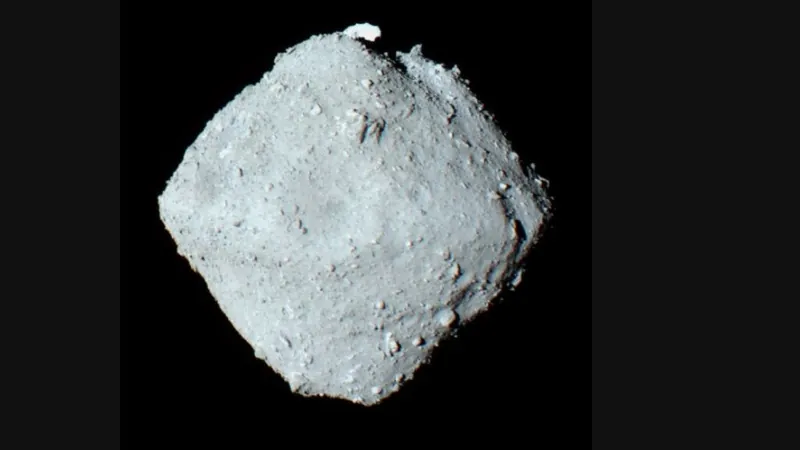
Asteroid Ryugu: New Evidence Suggests Liquid Water Once Flowed Inside!
2025-09-16
Author: Ken Lee
A groundbreaking study from Japanese scientists reveals a shocking possibility: the near-Earth asteroid Ryugu harbored flowing liquid water in its depths! This remarkable finding emerged from samples of the asteroid brought back to Earth five years ago.
What We Know About Ryugu
Ryugu, a roughly 3,000-foot-wide (900 meters) asteroid, completes an orbit around the sun every 474 days. Although it's categorized by NASA as 'potentially hazardous' due to its proximity to Earth, the risk of an impact is low.
Discoveries from Hayabusa2 Mission
The Japan Aerospace Exploration Agency's Hayabusa2 mission, which took place between 2018 and 2019, allowed scientists to land a probe on this unique, spinning space rock and return samples that arrived back on Earth in December 2020.
Chemical Clues Point to Water
In a study published in the prestigious journal Nature on September 10, researchers identified intriguing chemical anomalies in the Ryugu samples. These peculiarities suggest that flowing water last coursed through the asteroid billions of years ago.
Study lead author Tsuyoshi Iizuka from the University of Tokyo exclaimed, "We found that Ryugu preserved a pristine record of water activity!" He expressed astonishment at the evidence indicating that fluids had traversed the asteroid's rocky interior.
The Isotope Revelation
Researchers primarily analyzed specific radioactive isotopes: lutetium (Lu) and hafnium (Hf). They discovered an unexpectedly high level of Hf-176 in the samples, which suggested that ancient liquid water had washed away a significant proportion of Lu-176, dating back to Ryugu’s early formation.
A Watery Origin?
Iizuka proposed that a massive impact on Ryugu's parent asteroid likely fractured the rock, allowing buried ice to melt and liquid water to seep through.
Asteroid Family Connections
Recent observations from the James Webb Space Telescope hint that Ryugu's parent asteroid could also be linked to Bennu, another major space rock that NASA's OSIRIS-REx mission recently studied. However, so far, Bennu hasn’t showcased any signs of past watery activity, leaving the origins of these asteroids shrouded in mystery.
Implications for Earth's Water
Most intriguingly, the research implies that Ryugu's parent body may have held ice for over a billion years, contradicting prior beliefs about how long asteroids can retain water. Iizuka remarked, "This changes how we think about the long-term fate of water in asteroids. The water wasn’t exhausted quickly as we once thought."
This revelation has profound implications for our understanding of how Earth acquired its own water. The study suggests that asteroids could have contributed significantly more water to our planet than previously estimated, potentially delivering as much as three times the expected amount!
A New Perspective on a Vital Resource
The research adds a fascinating layer to our understanding of asteroids as potential water reservoirs in the early solar system. Could these celestial bodies have played a critical role in delivering the essential ingredient for life on Earth?


 Brasil (PT)
Brasil (PT)
 Canada (EN)
Canada (EN)
 Chile (ES)
Chile (ES)
 Česko (CS)
Česko (CS)
 대한민국 (KO)
대한민국 (KO)
 España (ES)
España (ES)
 France (FR)
France (FR)
 Hong Kong (EN)
Hong Kong (EN)
 Italia (IT)
Italia (IT)
 日本 (JA)
日本 (JA)
 Magyarország (HU)
Magyarország (HU)
 Norge (NO)
Norge (NO)
 Polska (PL)
Polska (PL)
 Schweiz (DE)
Schweiz (DE)
 Singapore (EN)
Singapore (EN)
 Sverige (SV)
Sverige (SV)
 Suomi (FI)
Suomi (FI)
 Türkiye (TR)
Türkiye (TR)
 الإمارات العربية المتحدة (AR)
الإمارات العربية المتحدة (AR)